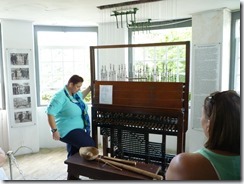Bait and Switch Tactics for Writers
Bait and Switch Tactics are a means to keep your reader on the edge of her seat when using multiple viewpoints. What you’ll want to do is isolate your characters, then write scenes in each person’s viewpoint with a cliffhanger at the end of every sequence. Make sure in each scene that you are in one character’s head so the reader can identify and care about this person. Then they’ll be to turn the pages to see what happens next.
Take the main characters in SILVER SERENADE as an example. In this science fiction romance, Silver is an assassin whose assignment is to kill Tyrone Bluth, leader of Tyrone’s Marauders. Jace Vernon, a hunted criminal, needs the terrorist alive to prove his innocence.
In one scene, Silver and Jace confront the terrorist leader in his lair. The purpose of this scene is to deliver important information to propel the action forward. To raise the suspense, I have isolated our protagonists. Here is how the scene breaks down into several sequences [spoiler alert]:
- Jace’s viewpoint. Jace and Silver, in disguise, present themselves as new recruits for Bluth’s terrorist network. They look for their contact, Gruber, at a saloon on the planet Al’ron. While sitting at the bar, Silver shrugs off a roughneck patron who makes a play for her. The fellow insults Jace, who kills him. After this display, their contact approaches and introduces them to the bandit leader. Impressed by Jace’s quick response, Bluth says they passed the first test. He’ll take Silver with him to his headquarters, but Jace must follow them alone in his ship. Jace fears for Silver’s safety. Or worse, will she use this opportunity to assassinate Bluth and leave him behind?
- Silver’s viewpoint. She is on a firing range at headquarters for Tyrone’s Marauders, being tested for her skills as a sharpshooter. She passes the test. Her supervisor marches her to the detention center where the evil Bluth snatches a captive child from his mother’s arms and demands Silver shoot him. Tempted to aim her laser rifle at Bluth instead, Silver manages to demonstrate her skill in a less lethal manner. During their dialogue, she learns a piece of important information. Bluth leads her away, while she wonders what’s happened to Jace who has failed to show up. Has he been caught?
- Jace’s viewpoint. Jace’s cover has been blown, and Bluth arrives to torture him in his prison cell. Bluth questions him about his contact, Gruber. Was Gruber duped by Jace, or was he a willing accomplice? Jace turns the interrogation around when he learns important news about his missing sister’s whereabouts. But what chills him is Bluth’s boast that Silver waits for him in his chamber, unaware the pirate knows full well who she really is and why she’s there.
- Silver’s viewpoint: Silver eludes her warden and seeks to rescue Jace. In the hallway, she hears approaching footsteps. She whips inside the nearest unlocked suite. It belongs to Bluth’s chief financial officer. After rendering the man unconscious, Silver copies data from his computer. This information may help prove Jace’s innocence and could also be used to cut off Bluth’s funding at its source. But this data will only be useful if she can escape the complex. How can she reach the detention center and free Jace?
- Jace’s viewpoint: Guards arrive to march Jace from his cell, and he figures he’s marked for death.
And so on. You get the idea? When I began this scene, I had no idea how it would play out. The sequences developed as I wrote, but each time I was in one character’s head, I left them at a critical juncture. Hopefully that will induce you, the reader, to keep turning pages to see what happens to them next.
In summary, to increase suspense, isolate your main characters and leave each one in jeopardy or fearing for the other’s safety at the end of each sequence. Switch back and forth until they meet again. This technique has been used successfully in many thrillers, and you can deploy it for your story as well. Hook your readers and reel them in!
Bait and Switch Tactics for Writers #amwriting #writetip Share on X










































































